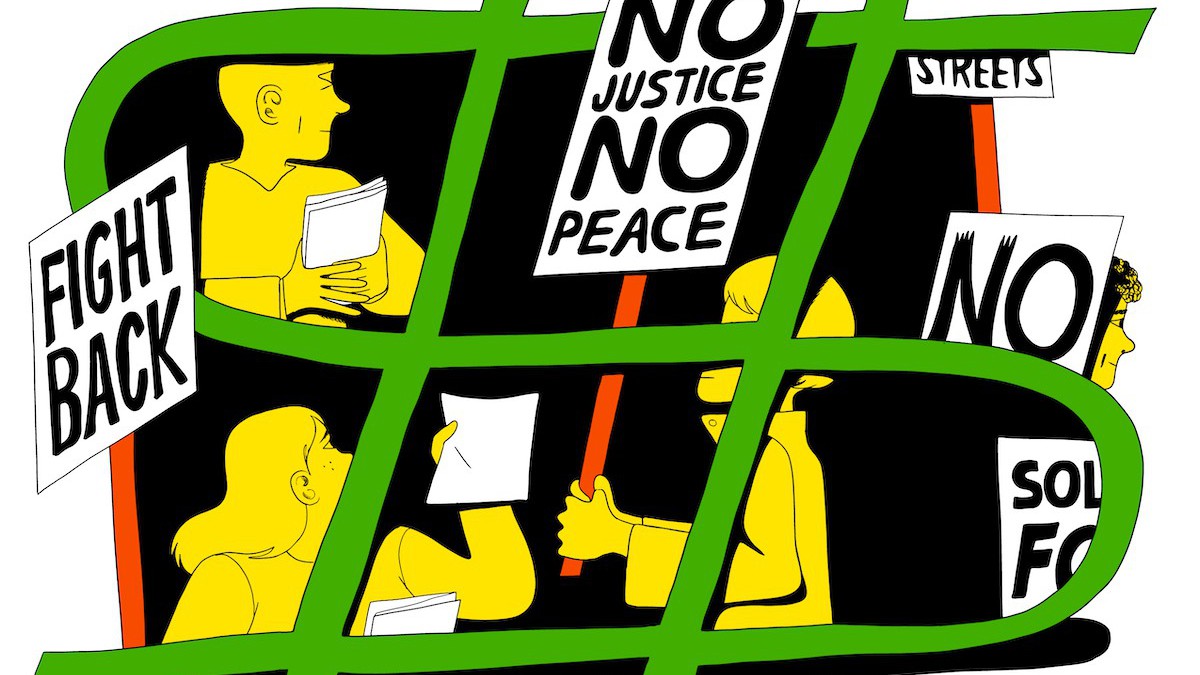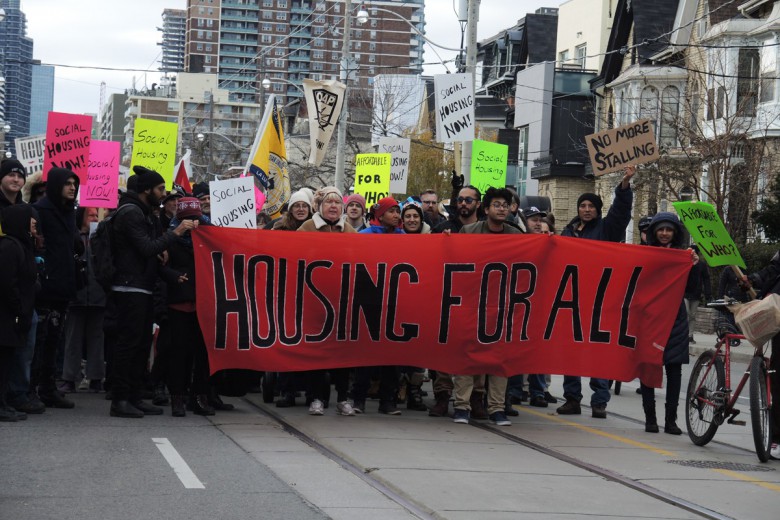No one knows precisely what kinds of social struggles are going to happen in the years ahead. But we can be certain that popular protest and resistance will be sparked by the ongoing economic crisis – what Marxist political economist Michael Roberts calls “the long depression” – along with the worsening ecological crisis and the efforts of capitalist states to manage them both.
This raises a question: what kind of culture should we be fostering in today’s workplace and community organizing, with a view to preparing ourselves for the high-stakes struggles and social movements of the future? There’s a lot that could be said about this, and I’m only going to touch on one aspect here.
Mass social movements with the power to defeat ruling-class attacks and win gains in our times require high levels of participation and militancy by very large numbers of people. Consider, for example, the months-long “red square” movement of students and their supporters in Quebec in 2012 that became a lightning rod for opposition to neoliberalism, the 2019–2020 “social outburst” in Chile that began as resistance to rising subway fares and grew into mass anti-neoliberal protests, and the protests and uprisings against racism in the U.S. in 2020.
There can be joy in working co-operatively for the common good within a competitive and hierarchical society. There’s nothing like a sweet taste of real freedom, however briefly it’s savoured.
With that in mind, people who wish to help lay the basis for such upheavals – and, when they occur, to help them go as far as they can go – should strive to act in certain ways. These are ways of conducting ourselves that have been learned in high points of class struggle and passed down by participants in such battles to those who came later, often by word of mouth. Some of these qualities feature in “The Wobbly Alphabet of Life,” a 1932 text from the Industrial Workers of the World (IWW):
“Be true to your class…
Don’t quit organizing…
Knock the system…
Xray yourself
Yield to no one
Zealously work for emancipation”
In a similar spirit, philosopher Steve D’Arcy has written about what revolutionary socialist Rosa Luxemburg called “socialist civic virtues”: “militancy, solidarity, collectivism, self-activity and ‘tenacity in struggle.’” These and other ways of acting are “admirable dispositions” that strengthen the resistance and freedom struggles of exploited and oppressed people. They animate a culture of social struggle.
We can see these admirable dispositions in the actions of many people whenever we study the history of movements and struggles. To mention only some North American examples, they’re visible in the IWW, One Big Union, and other radical industrial unions of the first half of the 20th century as well as in the law-defying strikes, and Black Liberation and Red Power movements of the 1960s and ’70s.
Taking part in a strike or social movement that really fights to win is often life changing. Participation has its personal rewards. Individuals who alone can do little coming together and exercising some power to change the world is exhilarating. There can be joy in working co-operatively for the common good within a competitive and hierarchical society. There’s nothing like a sweet taste of real freedom, however briefly it’s savoured.
These and other ways of acting are “admirable dispositions” that strengthen the resistance and freedom struggles of exploited and oppressed people. They animate a culture of social struggle.
What taking part in such a fight doesn’t do is pay. On the contrary: it involves sacrificing time, money, and sometimes more for the cause. That’s why we need to talk about the culture of paid activism that exists in unions and some activist groups today. It’s incompatible with the kind of culture of social struggle we should be fostering.
At the heart of this sensibility “is a notion of recasting union work (or movement work) as being comparable to paid work,” as Toronto union activist Ryan Hayes puts it. Although it’s rare for people to take it all the way to its logical conclusion, the logic of this belief is that it would be ideal if all members of a union or activist group were paid for the time they contribute to the work of the organization. This isn’t about organizations having paid staff – that’s a different issue. It’s about paying members for their contributions.
A number of union activists and staff report that what I call the culture of paid activism is becoming more influential. “Now everyone wants to be paid for every minute of union work” is a common complaint of union officials relayed to me by a CUPE staffer. A PSAC member observes, “I am noticing an increasing expectation for compensation for participation in union leadership activities.” Winnipeg CUPW activist Basia Sokal describes members refusing to go to union committee meetings if they’re not “booked off” (granted leave from their jobs to do union work). In some unions, members are paid honorariums for coming to a certain proportion of meetings of the bodies on which they serve in some capacity. Another aspect of this culture is how, as Toronto anti-poverty fighter John Clarke points out, union officials may offer activists “petty perks and privileges” – such as staying in fancy hotels when attending union conferences – to bring them “into the fold.” But, he adds, “if you’re too oppositional, those doors shut.”
This culture is strongest in unions, but it’s not just a union thing. We can see the culture of paid activism manifested in, for example, activists offering money to people for speaking at a political forum or to members for leafleting. It’s there in the idea that if we want poor people to participate they need to be paid. The idea that mostly white activist groups should aim to offer money to Indigenous and/or racialized members for doing work for which white members wouldn’t be given money is a variation on the theme.
"This way of organizing benefits the system, of course, because people start seeing organizing as a career rather than as involvement in a social movement that requires sacrifice.”
To be clear, the culture of paid activism is completely different from membership organizations covering members’ costs to help people participate. Reimbursing people for transportation to meetings, parking, food and child-care expenses, or providing such supports so that activists don’t have to pay for them out of pocket helps people to work for social change. The culture of paid activism is also different from organizations compensating members for significant amounts of lost income – for example, when someone takes time off from their job or regular freelance work to devote time to the cause. Covering costs and replacing lost income are not at all the same as giving members money for doing the regular work of an activist organization, which is the core of the culture of paid activism. An organization asking an artist who’s not a member of the group to make something and paying that artist for the artwork is also different from giving members money for doing the work of the organization.
Making a culturally appropriate offering to an Indigenous guest – for example, offering tobacco and perhaps also another gift to an Elder who opens an event – has nothing to do with paid activism; it’s about respecting Indigenous cultural protocols on Turtle Island.
To avoid another confusion: the question of how unions and activist groups fighting for social justice should deal with money is an entirely different matter from how radicals whose paid work is in NGOs or educational and cultural institutions – which aren’t movement organizations and shouldn’t be confused with them – should push management to compensate artists, speakers, and other people whose assistance is being requested.
Toronto organizer and editor Sharmeen Khan points out that “typically BIPOC women engage in a lot of unseen and invisible work” in the home and in organizing, “whether they take on ensuring accessibility, child care, providing food. In response to this, many feminists of colour have had this ‘FUCK YOU, PAY ME’ response.” There’s no problem when this is aimed at an NGO or university. But in organizing, Khan says, “Is the answer monetary payment for that work? I think definitely not! The answer is to collectivize these responsibilities and tasks as best as possible. To make our spaces nourishing, empowering spaces where we invest in the leadership of those who have been kept out of it.”
What’s wrong with the culture of paid activism? In her chapter in the book The Revolution Will Not Be Funded, Madonna Thunder Hawk puts it this way: “when you start paying people to do activism, you can start to attract people to the work who are not primarily motivated by or dedicated to the struggle. In addition, getting paid to do the work can also change those of us who are dedicated. Before we know it, we start to expect to be paid and do less unpaid work than we would have before. This way of organizing benefits the system, of course, because people start seeing organizing as a career rather than as involvement in a social movement that requires sacrifice.”
“Is the answer monetary payment for that work? I think definitely not! The answer is to collectivize these responsibilities and tasks as best as possible. To make our spaces nourishing, empowering spaces where we invest in the leadership of those who have been kept out of it.”
The culture of paid activism is at best counter to the culture of social struggle. The spirit that needs cultivating, because it’s fuel for collective action against injustice, is one of “how can I co-operate with other people to change society for the better, with no thought of getting money for my efforts?” The individualism of “what’s in it for me?” is a barrier to commitment and solidarity. The notion that the work of ordinary people fighting for justice is comparable to paid work gets in the way of building movements to transform society because no mass movement could ever possibly pay everyone for participating even if this were desirable. At worst, the culture of paid activism comes close to bribing people to participate – an extremely fragile basis on which to build anything. People whose participation in a union or community group depends on receiving money for their time are prone to being bought off by foes with deeper pockets.
Of course, most union and community activist work is done by people who never get any money for it and who don’t think they should. But it’s worth thinking a bit about why the culture of paid activism is getting stronger.
I think the spread of the culture of paid activism comes in part from living in a capitalist society in which jobs are more insecure, more of our energies are spent on paid work than ever before, we’re increasingly forced to depend on money to get things we need to live, and people are in record levels of debt. Many people are short on money and time – a staffer for a health-care workers’ union observes that “[o]ur lowest paid members are so stretched and many have two and three jobs.” In an interview with Teen Vogue, Amelia Horgan, the author of Lost in Work, noted that “[f]or some people, the response to developing a new hobby is to think, Okay, great, now how can I monetize this? Some of this points to the fact that for many, a secure job that can reliably cover your living expenses is not guaranteed.” Some people bring that same attitude to their activism.
However, I think there’s more to what’s going on than the pressures of getting by. Many working-class people in much worse conditions than ours have rejected – and in other places today, still reject – the idea that they should get money for their activism.
However, I think there’s more to what’s going on than the pressures of getting by. Many working-class people in much worse conditions than ours have rejected – and in other places today, still reject – the idea that they should get money for their activism. But the weakness of what Alan Sears in his book The Next New Left calls the “infrastructure of dissent” – “the means through which activists develop political communities capable of learning, communicating and mobilizing together” through “a variety of forms, ranging from informal neighbourhood and workplace networks to formal organizations and structured learning settings” – makes a difference here. A strong infrastructure of dissent nurtures habits and values on a large scale that challenge those of the market, the boss, the state, the university, bureaucratic unionism, and the NGO; a weak infrastructure of dissent has little power to do so.
In our context, then, our habits and values are rarely shaped by a culture of militant workplace, community, or campus organizing. The practices of bureaucratic unionism influence many union members. In neighbourhoods and on campuses, it’s service-providing NGOs that usually set the tone. A Toronto activist describes their experience: “I have also found working in certain low-income neighbourhoods, peoples’ only experience with organizations is of service organizations (e.g., drop-ins, faith groups), so they have an expectation of receiving a gift card for participating in any form of activity, including a campaign or ‘know your rights’ training.”
Is it any wonder that people instinctively think “I should get money for the time I give” when we live in a society in which working-class values of co-operation, solidarity, and commitment to the common good are drowning in “the icy water of egotistical calculation,” to use a phrase of Karl Marx and Friedrich Engels? If union activity is uninspiring, should we be surprised if it doesn’t motivate people to give of their time without thought of financial compensation? If people haven’t experienced a real social movement, only sporadic protests, why would they recognize the difference between the values of social struggle and those of “progressive” NGOs and academia?
The main way capitalism recognizes the worth of an activity is with money. The weaker the infrastructures of dissent of the working class and communities of oppressed people, the more the values of the system will shape how people – including anti-capitalists – think.
In Recovering Antiracism: Reflections on Collectivity and Solidarity in Antiracist Organising, Azfar Shafi and Ilyas Nagdee point out that “[i]n popular or mainstream discourse, solidarity is increasingly being replaced by the framework of ‘allyship,’ or as a transactional, rather than a transformative, relationship. ‘Allyship’ reduces solidarity to a fragile politics of temporary togetherness between groups or struggles that will remain otherwise separate. It is predicated on a vertical relationship between partners, rather than the more generative, horizontal process of building solidarity across difference. Meanwhile the moves towards a ‘transactional’ logic of solidarity transforms it into a mechanical, almost market-style, exchange.” In our context, few people really think through what it means to work together “because your liberation is bound up with mine,” to quote from the famous words addressed by a group of Indigenous activists to white people in Australia in the 1970s. For that reason, it’s not a big leap to make a transactional exchange a financial one.
The main way capitalism recognizes the worth of an activity is with money. The weaker the infrastructures of dissent of the working class and communities of oppressed people, the more the values of the system will shape how people – including anti-capitalists – think. It’s this weakness along with the pressures of getting by in hard times that are leading to a spread of the culture of paid activism. I hope that naming what’s going on and explaining why it’s happening will help us resist this trend and cultivate a very different political culture.





_780_520_90_s_c1.jpg)

